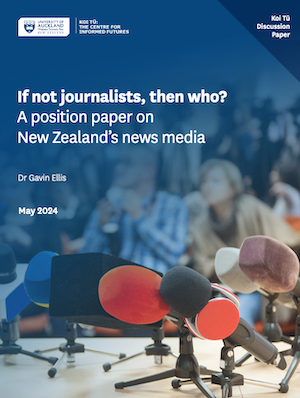
Koi Tū
New Zealand cannot sit back and see the collapse of its Fourth Estate, the director of Koi Tū: The Centre for Informed Futures, Sir Peter Gluckman, says in the foreword of a paper published today.
The paper, “If not journalists, then who?” paints a picture of an industry facing existential threats and held back by institutional underpinnings that are beyond the point where they are merely outdated.
It suggests sweeping changes to deal with the wide impacts of digital transformation and alarmingly low levels of trust in news.
- READ MORE: The full Koi Tū media report – Dr Gavin Ellis

The paper’s principal author is Koi Tū honorary research fellow Dr Gavin Ellis, who has written two books on the state of journalism: Trust Ownership and the Future of News and Complacent Nation.
He is a former newspaper editor and media studies lecturer, and also a member of Asia Pacific Media Network. The paper was developed following consultation with media leaders.
“We hope this paper helps open and expand the conversation from a narrow focus on the viability of particular players,” Sir Peter said, “to the needs of a small liberal democracy which must face many challenges in which citizens must have access to trustworthy information so they can form views and contribute appropriately to societal decision making.
“Koi Tū’s core argument, along with that of many scholars of democracy, is that democracy relies on honest information being available to all citizens. It needs to be provided by trustworthy sources and any interests associated with it must be transparently declared.
Decline in trust
“The media itself has contributed much to the decline in trust. This does not mean that there is not a critical role for opinion and advocacy — indeed democracy needs that too. It is essential that ideas are debated.
“But when reliable information is conflated with entertainment and extreme opinion, then citizens suffer and manipulated polarised outcomes are more likely.”
Dr Ellis said both news media and government were held to account in the paper for the state in which journalism in New Zealand now found itself. The mixing of fact and opinion in news stories was identified as a cause of the public’s low level of trust, and online analytics were found to have aberrated news judgement previously driven by journalistic values.
For their part, successive governments have failed to keep pace with changing needs across a very broad spectrum that has been brought about by digital transformation.
Changes suggested in the paper include voluntary merger of the two news regulators (the statutory Broadcasting Standards Authority and the industry-supported Media Council) into an independent body along lines recommended a decade ago by the Law Commission.
The new body would sit within a completely reorganised — and renamed — Broadcasting Commission, which would also be responsible for the day-to-day administration of the Classifications Office, NZ On Air and Te Māngai Pāho.
An administrative umbrella
The reconstituted commission would become the administrative umbrella for the following autonomous units:
- Media accountability (standards and complaints procedures)
- Funding allocation (direct and contestable, including creative production)
- Promotion and funding of Māori culture and language.
- Content classification (ratings and classification of film, books, video gaming)
- Review of media-related legislation and regulation, and monitoring of common law development, and
- Research and advocacy (related civic, cultural, creative issues).
The paper also favours dropping the Digital News Fair Bargaining Bill (under which media organisations would negotiate with transnational platforms) and, instead, amending the Digital Services Tax Bill, now before the House, under which the proposed levy on digital platforms would be increased to provide a ring-fenced fund to compensate media for direct and indirect use of their content.
It also suggests changes to tax structures to help sustain marginally profitable and non-profit media outlets committed to public interest journalism.
Seventeen separate Acts of Parliament affecting media are identified in the paper as outdated — “and the list is nor exhaustive”. The paper recommends a comprehensive and closely coordinated review.
The Broadcasting Act is currently under review, but the paper suggests it should not be re-evaluated in isolation from other necessary legislative reforms.
The paper advises individual media organisations to review their editorial practices in light of current trust surveys and rising news avoidance. It says these reviews should include news values, story selection and presentation.
They should also improve their journalistic transparency and relevance to audiences.
Collectively, media should adopt a common code of ethics and practice and develop campaigns to explain the role and significance of democratic/social professional journalism to the public.
Statement of principles
A statement of journalistic principles is included in the paper:
“Support for democracy sits within the DNA of New Zealand media, which have shared goals of reporting news, current affairs, and information across the broad spectrum of interests in which the people of this country collectively have a stake.
“Trained news media professionals, working within recognised standards and ethics, are the only group capable of carrying out the functions and responsibilities that have been carved out for them by a heritage stretching back 300 years.
“They must be capable of holding the powerful to account, articulating many different voices in the community, providing meeting grounds for debate, and reflecting New Zealanders to themselves in ways that contribute to social cohesion.
“They have a duty to freedom of expression, independence from influence, fairness and balance, and the pursuit of truth.”
Republished from Koi Tū: The Centre for Informed Futures.












































